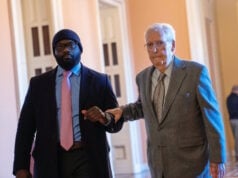
BY HOLLY RAMER
Whatever possessed Vice President Kamala Harris to pick Minnesota Gov. Tim Walz as her running mate, it probably wasn’t a desire to inflame arguments about apostrophes. But it doesn’t take much to get grammar nerds fired up.
“The lower the stakes, the bigger the fight,” said Ron Woloshun, a creative director and digital marketer in California who jumped into the fray on social media less than an hour after Harris selected Walz last week to offer his take on possessive proper nouns.
The Associated Press Stylebook says “use only an apostrophe” for singular proper names ending in S: Dickens’ novels, Hercules’ labors, Jesus’ life. But not everyone agrees.
Debate about possessive proper names ending in S started soon after President Joe Biden cleared the way for Harris to run last month. Is it Harris’ or Harris’s? But the selection of Walz with his sounds-like-an-s surname really ramped it up, said Benjamin Dreyer, the retired copy chief at Random House and author of “Dreyer’s English: An Utterly Correct Guide to Clarity and Style”.
“I was like, ‘All right, everybody just has to chill. I’ll be home in a little while and I can get to my desk,’” he said.
While there is widespread agreement that Walz’s is correct, confusion persists about Harris’ vs. Harris’s. Dreyer’s verdict? Add the ’s.
Woloshun chimed in with a similar opinion on the social platform X, where apostrophes are being thrown around like hand grenades. “The rule is simple: If you say the S, spell the S,” he argued.
That puts them on the same side as The New York Times, The Washington Post and The Wall Street Journal — and at odds with AP.
“This is a longstanding policy for the AP. It has served us well, and we’ve not seen any real need to change,” she said. “We do know that the conversation is out there and people make different choices when it comes to grammar, and that’s all fine. Everyone makes a choice that works best for them.”
Timothy Pulju, a senior lecturer in linguistics at Dartmouth College, said that until the 17th or 18th century, the possessive of proper names ending in S — such as Jesus or Moses — often was simply the name itself with no apostrophe or additional S. Eventually, the apostrophe was added (Jesus’ or Moses’) to denote possession, though the pronunciation remained the same.
“That became kind of the standard that I was taught and adhere to, even though in retrospect, I don’t think it’s a great standard,” he said.
That’s because linguists view writing as a representation of speech, and speech has changed since then. Pulju said he expects the ’s form to become dominant eventually. But for now, he — along with the Merriam-Webster dictionary — says either way is acceptable.
If she wins in November, Harris would become the fourth U.S. president with a last name ending in S and the first since Rutherford B. Hayes, who was elected in 1876 — 130 years before the founding of Twitter — and was spared the social media frenzy over apostrophes. Harris is the first nominee with such a tricky last name since 1988, when Democrat Michael Dukakis lost to George H.W. Bush.
Dukakis, now 90, said in a phone interview Monday that he doesn’t recall any similar discussion when he was the nominee. But he agrees with the AP.
“It sounds to me like it would be s, apostrophe, and that’s it,” he said.
___
This story has been updated to correct that Harris would be the fourth president with a last name ending in S, not third and that Dukakis lost in 1988, not 1984.
Disclaimer
The information contained in South Florida Reporter is for general information purposes only.
The South Florida Reporter assumes no responsibility for errors or omissions in the contents of the Service.
In no event shall the South Florida Reporter be liable for any special, direct, indirect, consequential, or incidental damages or any damages whatsoever, whether in an action of contract, negligence or other tort, arising out of or in connection with the use of the Service or the contents of the Service.
The Company reserves the right to make additions, deletions, or modifications to the contents of the Service at any time without prior notice.
The Company does not warrant that the Service is free of viruses or other harmful components












